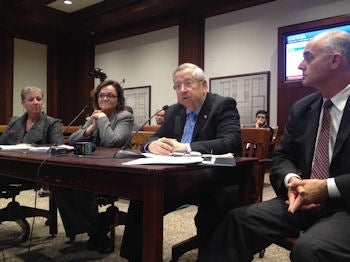Assisted living facilities push for wider services from nurses
 Colin A. Young/SHNS
Former Sen. Richard Moore (center), now president of the Massachusetts Assisted Living Facilities Association, testified Tuesday before the Joint Committee on Elder Affairs.
Colin A. Young/SHNS
Former Sen. Richard Moore (center), now president of the Massachusetts Assisted Living Facilities Association, testified Tuesday before the Joint Committee on Elder Affairs.
As the state's over-65 population surges, the past and present presidents of the Massachusetts Assisted Living Facility Association tried Tuesday to sway lawmakers to opposite sides of a bill that would allow nurses working at an assisted living facility to provide certain health care services.
Richard Moore, the former state senator who now serves as president of Mass-ALFA, backed a bill (S 2139) that he said will lead to more seniors being able to remain in the home-like setting of assisted living while receiving the "routine, non-invasive medical treatments" they need.
"The problem has been that sometimes an individual goes into assisted living possibly to be able to live there for a long time, perhaps throughout the rest of their life, they find as they pick up some of these needs that they can't get services," Moore said.
The only procedures a facility would be allowed to offer are "intravenous, intramuscular, or subcutaneous injection; application or replacement of dressings when the physician has prescribed irrigation, the application of medication, or sterile dressings of skin disorders, or care of wounds to provide safe and effective services; administration of oxygen on a regular and continuing basis when the resident's medical condition warrants skilled observation; insertion, sterile irrigation, and replacement of 'straight' catheters; or application of ointments or drops," according to the bill.
Assisted living facilities would be required to submit to the Executive Office of Elder Affairs an operating plan detailing which health services its staff would offer, what level of training the staff has received and how offering the services would benefit the residents. That plan must be approved before the facility offers the health services.
Julie Lombardo, a registered nurse who works at an assisted living facility, told the Joint Committee on Elder Affairs that she is prohibited from administering an EpiPen to a resident who has an allergy to bee stings, because the EpiPen is considered an injection. The bill would allow Lombardo and other nurses to use EpiPens and give residents daily shots of insulin, among other treatments.
Robert Larkin, president of Senior Living Residences and a former president of Mass-ALFA, told the committee that "it is unimaginable to me how this could be done in a safe way in the current setting."
"There is a germ of a good idea in this bill. The germ of the idea is that there are nurses who work in assisted living and there are things those nurses may -- underline the word may -- be confident to do, but they're not allowed to do them as employees of the assisted living facility," he said. "The problem with this notion of diving headlong into permitting nurses who work for assisted living companies to provide these skilled services is that it's both unsafe and it's unfair."
Larkin suggested that if the bill were to pass, assisted living facilities would put pressure on their nurses to provide as many health services as possible, even if the nurses are not fully comfortable doing so, creating an unsafe clinical environment.
The unfair aspect of the bill, Larkin said, is that assisted living residents may not be able to use their Medicare insurance to pay for the health services if they are not provided by a Medicare-certified nursing agency, creating the potential for greater costs to the patient.
Because it was admitted as a late-file bill, the committee is able to consider how it will report on the bill beyond Wednesday's biennial bill reporting deadline. House Chair Denise Garlick said the committee has until the end of next week to report on the bill.









0 Comments